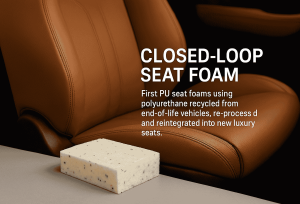Overview
-
In November 2024, Jaguar Land Rover (JLR), Dow, and Adient achieved an industry-first by successfully using recycled polyurethane (PU) foam from end-of-life vehicles to produce new seat foam for luxury car seats.
-
The effort was spearheaded by JLR’s Circularity Lab located at its Gaydon HQ, which fosters cross-functional collaboration—bringing together sustainability experts, engineers, designers, procurement teams, and supply chain partners—to dismantle vehicles and identify recyclable components.
How It Works
1. Collection & Recycling Process
-
Used PU seat foam is harvested, sorted, and shredded to prepare for recycling.
-
Dow employs its RENUVA™ depolymerization technology to convert the shredded material into recycled polyol (“re-polyol”).
2. Prototype Development
-
The recycled polyol is integrated into Adient’s seating formulation. In this prototype, 20% of the foam content comes from the closed-loop recycled polyol.
-
This marks the first known instance of a PU molded–foam for automotive seating being produced under such a closed-loop arrangement.
Environmental Impact
-
CO₂e impact is nearly halved, with early assessments indicating a reduction of over 44 kg of CO₂e per seat—equivalent to charging around 3,000 smartphones.
-
Dow’s RENUVA™ process is said to cut lifecycle CO₂e emissions by approximately 50% compared to virgin polyol.
Read Also: Automotive Interior Materials Market
Next Steps & Scaling
-
Production-scale testing of the recycled-foam seats is scheduled to begin in early 2025, with the goal of integrating the technology across JLR’s vehicle lineup.
-
As part of the Circularity Lab’s mission, JLR is also evaluating how far the recycled-content percentage can be increased for even greater sustainability.
-
JLR may introduce this circular-seat material into production vehicles by 2026, depending on test results and scaling feasibility.
Why It’s a Milestone
-
Material Complexity: PU seat foam is notoriously difficult to recycle due to its durability and multi-component nature. This breakthrough overcomes that challenge.
-
Circular Supply Chain: Creating a closed-loop system for seat foam not only reduces waste but also secures a low-carbon material source, bolstering supply chain resilience.
-
Luxury Standards Preserved: Despite using recycled content, the foam maintains the comfort and quality expected in luxury-class vehicle seating.
-
Strategic Collaboration: Dow contributes material science and recycling tech; Adient brings seating-system manufacturing expertise; JLR drives innovation via its Circularity Lab and sustainability strategy.
-
Policy Alignment: This initiative aligns with environmental regulations such as the European End-of-Life Directive, emphasizing the reuse and standardization of recycled content.
Summary Table
| Aspect | Details |
|---|---|
| Partners | JLR (Circularity Lab), Dow (MobilityScience™, RENUVA™), Adient |
| Material | Closed-loop recycled PU foam via 20% re-polyol content |
| CO₂e Reduction | Over 44 kg CO₂e saved per seat (≈50% reduction) |
| Testing Timeline | Prototypes developed Nov 2024; production tests in early 2025; scaling toward ~2026 |
| Significance | Landmark circularity in challenging material; high luxury quality preserved; supply chain innovation |
Contact Us: sales@precedenceresearch.com
